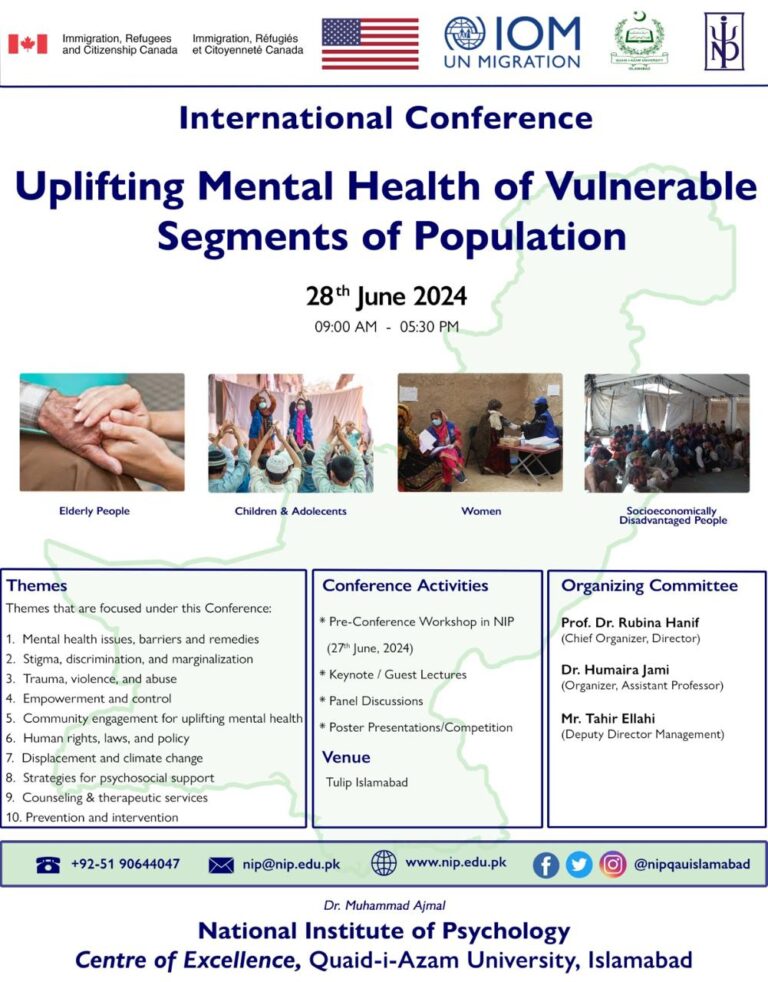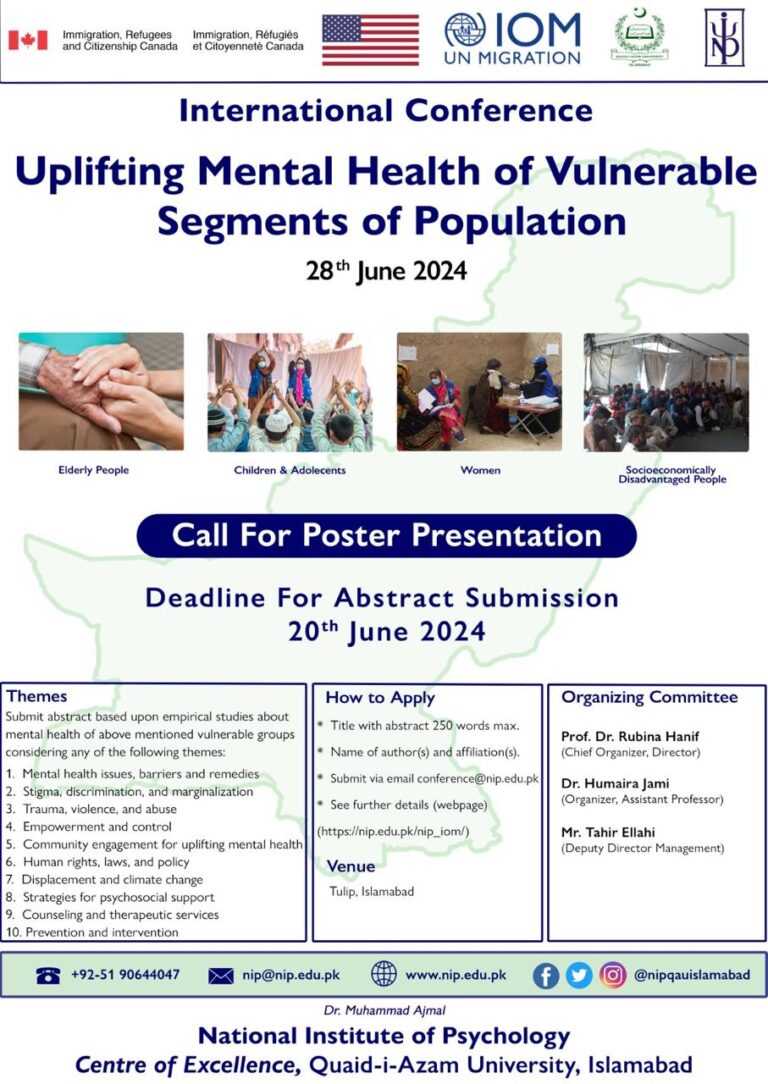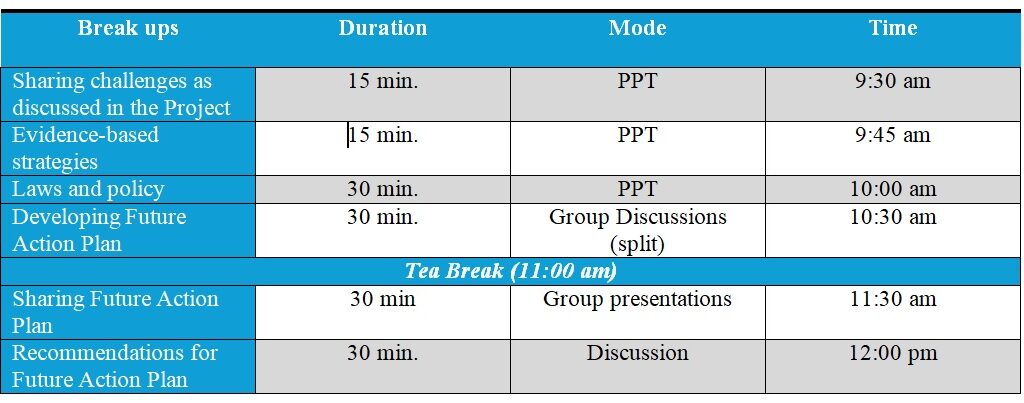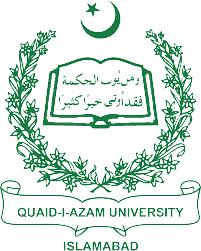NIP_IOM_Conference280624

About Conference
Conference is going to be held as a part of Project “Uplifting Mental Health of Vulnerable Segments of Population” sponsored by International Organization of Migration (IOM). Focus is on uplifting mental health of elderly, women, children and adolescents, and socioeconomically disadvantaged people.
Conference activities included guest speeches/keynotes, panel discussions, group presentations, and poster presentations based upon following themes.
- Mental health issues, barriers and remedies
- Stigma, discrimination, and marginalization
- Trauma, violence, and abuse
- Empowerment and control
- Community engagement for uplifting mental health
- Human rights, laws, and policy
- Displacement and climate change
- Strategies for psychosocial support
- Counseling and therapeutic services
- Prevention and intervention
Who can Participate?
- Mental Health Professionals
- Health Care Providers
- Social Workers
- Service Providers
- Stakeholders

CALL FOR POSTER PRESENTATIONS
Abstracts based on Empirical Research

Template for Abstract Submission of Empirical Paper (Poster)
Powered By EmbedPress
About Sponsor
In the last year, International Organization of Migration (IOM) Pakistan has scaled up its operations and presence in country to respond to the influx of Afghan refugees since 2021 when the Taliban took over the government. By the end of March 2022, it is estimated around 1.3 million Afghan refugees are residing in Pakistan. Additionally, since mid-June 2022, Pakistan has been hit with severe flooding and landslides caused by heavy monsoon rainfall have brought. The current flood crisis in Pakistan has killed over 1,500 people, destroyed close to one million houses; with 33 million people estimated to be directly impacted where it has been estimated 46% of the affected population are children. With this, IOM Pakistan has been scaling up its response in country to support the different emergencies. With more implementing partners being engaged and higher engagement with beneficiaries, it is essential that all the stakeholders are sensitized about the mental health of Afghan migrants.
Since 1998, IOM has provided mental health services and psychosocial support to migrants, displace and conflict affected population in many countries worldwide. Individuals with good mental health can cope with the normal stressors of life and can contribute to his or her society. This conference would aim to facilitate mental health and psychosocial support (MHPSS) experts and managers in designing, implementing, and evaluating mental health and psychosocial support projects and activities for emergency-affected and displaced populations in humanitarian settings. This activity would aim to discuss the collective and contextual elements of consequences of adversities and possible solutions for the mental health issues faced by migrants, displaced, and the affected community. The participants would learn to work on improve the collective reactions to adversity and of social cohesion, social supports, identities, and social textures in determining individual and social wellbeing after disasters.
Conference Themes
Empirical studies focusing on mental health of elderly, women, children and adolescents, or disadvantaged population. Following themes may be followed:
1. Mental health issues, barriers and remedies
2. Stigma, discrimination, and marginalization
3. Trauma, violence, and abuse
4. Empowerment and control
5. Community engagement for uplifting mental health
6. Human rights, laws, and policy
7. Displacement and climate change
8. Strategies for psychosocial support
9. Counseling and therapeutic services
10. Prevention and intervention
Poster Guidelines
Poster Size for all Formats
The poster size is 30 (width) x 60 (Height) inches. Please submit your posters with standee as no poster will be accepted for display without standee.
All Types of Poster will follow the conference theme.
Format for Empirical Posters
For the empirical posters follow the APA-7 research write-up format for representing information in a sequence which is easily understandable. Focus on brief text and present idea and findings of your research in figural format. Posters will be evaluated on the basis of novelty, originality, clarity, organization and presentation, appearance, and contribution and implication.
Relevant to your work following key points can be identified and addressed:
1. Paper title and names of all authors and their institutional affiliations at the top of the poster
2. Abstract (briefly summary of research)
3. Introduction (Text information with background to address the problem statement. It is not advisable to display the entire text from a manuscript)
4. Method (clearly state the objective, hypotheses, sample, instruments, and procedure of research data collection)
5. Results and Discussion (Use figures and tables to address the objectives and hypotheses stated in method section and relevant supportive literature)
6. Conclusion (salient findings of the research)
7. Limitations and Suggestions
8. Acknowledgements (if any)
Preconference Workshop
Preconference Workshop: Future Action Plan to Uplift Mental Health of Vulnerable Segments of Population
Time: 9:30 am – 12:30 pm
Duration: 3 Hours
Participants: 40 (10 from each group)
Format: Discussion and Presentation

Preconference Workshop Program
Registration Form
Powered By EmbedPress


